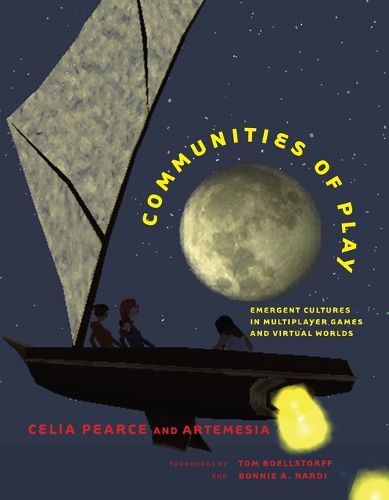Readings Newsletter
Become a Readings Member to make your shopping experience even easier.
Sign in or sign up for free!
You’re not far away from qualifying for FREE standard shipping within Australia
You’ve qualified for FREE standard shipping within Australia
The cart is loading…






Play communities existed long before massively multiplayer online games;they have ranged from bridge clubs to sports leagues, from tabletop role-playinggames to Civil War reenactments. With the emergence of digital networks, however, new varieties of adult play communities have appeared, most notably within onlinegames and virtual worlds. Players in these networked worlds sometimes develop asense of community that transcends the game itself. In Communities of Play, gameresearcher and designer Celia Pearce explores emergent fan cultures in networkeddigital worlds–actions by players that do not coincide with the intentions of thegame’s designers. Pearce looks in particular at the Uru Diaspora–a group of playerswhose game, Uru: Ages Beyond Myst, closed. These players (primarily baby boomers)immigrated into other worlds, self-identifying as refugees ; relocated inThere.com, they created a hybrid culture integrating aspects of their old world.Ostracized at first, they became community leaders. Pearce analyzes the propertiesof virtual worlds and looks at the ways design affects emergent behavior. Shediscusses the methodologies for studying online games, including a personal accountof the sometimes messy process of ethnography. Pearce considers the playturn in culture and the advent of a participatory global playground enabled bynetworked digital games every bit as communal as the global village Marshall McLuhansaw united by television. Countering the ludological definition of play asunproductive and pointing to the long history of pre-digital play practices, Pearceargues that play can be a prelude to creativity.
$9.00 standard shipping within Australia
FREE standard shipping within Australia for orders over $100.00
Express & International shipping calculated at checkout
Play communities existed long before massively multiplayer online games;they have ranged from bridge clubs to sports leagues, from tabletop role-playinggames to Civil War reenactments. With the emergence of digital networks, however, new varieties of adult play communities have appeared, most notably within onlinegames and virtual worlds. Players in these networked worlds sometimes develop asense of community that transcends the game itself. In Communities of Play, gameresearcher and designer Celia Pearce explores emergent fan cultures in networkeddigital worlds–actions by players that do not coincide with the intentions of thegame’s designers. Pearce looks in particular at the Uru Diaspora–a group of playerswhose game, Uru: Ages Beyond Myst, closed. These players (primarily baby boomers)immigrated into other worlds, self-identifying as refugees ; relocated inThere.com, they created a hybrid culture integrating aspects of their old world.Ostracized at first, they became community leaders. Pearce analyzes the propertiesof virtual worlds and looks at the ways design affects emergent behavior. Shediscusses the methodologies for studying online games, including a personal accountof the sometimes messy process of ethnography. Pearce considers the playturn in culture and the advent of a participatory global playground enabled bynetworked digital games every bit as communal as the global village Marshall McLuhansaw united by television. Countering the ludological definition of play asunproductive and pointing to the long history of pre-digital play practices, Pearceargues that play can be a prelude to creativity.